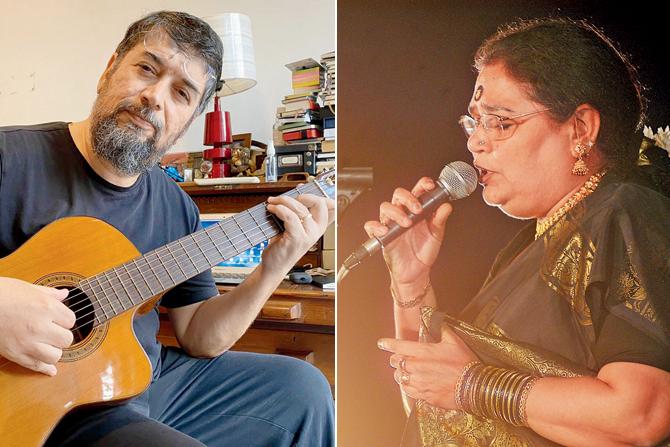Hard-hitting multilingual lyrics reflect the city's encounters with gritty reality, battling terror, floods and now, the panic of pandemic

A video clip featuring the song, Aai shapath Saheb, me navtho, shows rapper Tony Sebastian mistakenly detained by Vijay Maurya playing the cop. Pic courtesy /Dopeadelicz
 Let's go staccato," Jaaved Jaaferi simply suggested to his co-writer Kiran Kotrial. They did, with an aptness and aplomb which catapulted "I am Mumbhai" from Kaizad Gustad's 1998 film, Bombay Boys, to hit status. No. 1 on the charts for six weeks in a row, stirring up a vibe about the city underbelly overrun by gangs of dons, the rap piece fully soaked in the piquant flavours of Bombay.
Let's go staccato," Jaaved Jaaferi simply suggested to his co-writer Kiran Kotrial. They did, with an aptness and aplomb which catapulted "I am Mumbhai" from Kaizad Gustad's 1998 film, Bombay Boys, to hit status. No. 1 on the charts for six weeks in a row, stirring up a vibe about the city underbelly overrun by gangs of dons, the rap piece fully soaked in the piquant flavours of Bombay.
Reviews raved from "Ekdum jhakkas gaana" to "Pity the fools who dislike this, either they aren't from the glorious '90s or don't understand the lyrics". Opening in English, to soon skillfully segue Hindi with smatterings of Marathi and Gujarati, its words distilled the core of bhaigiri: "Admission election/telephone connection/construction permission, illegal erection/paisa nu collection, paper nu correction/Everything perfection jabi leve bhai action."
ADVERTISEMENT
With music by Ashutosh Phatak and Dhruv Ghanekar, fiercely cadenced "I am Mumbhai" is honest from the get-go. "Mumbai ekdum danger place/Where you survive if you've got the pace/You've gotta be fast, you've gotta be tez/You've gotta be shaana to win the race."
Jaaferi's unapologetic satire on the system refused to steer clear of robust expletives, including one eventually beeped out after the initial "ch" syllable. "Popular culture then threw around vague phrases like 'kuttey kaminey' as outrage, which no one uses in roadside fights. Without shying from reality, we injected lingo as it is uttered, the raw aggression of anger that erupts in swearing and cussing."

Jaaved Jaaferi
Mid-song, he goes, "Chhota chhota matter baney police case/bada bada lafda gul without trace/ghabraane ka nai, give it in the face."
Twenty years later, Tony Sebastian, aka Stony Psyko, belted out the gritty ditty, "Aai shapath Saheb, me navtho (I swear on my mother, it wasn't me)", about a man wrongly detained by the police. The Marathi composition is by the Dopeadelicz group from Matunga-Dharavi. "This referred to a true incident," says Tony, who is from Tamil Nadu. "One night after an event, my pals and I were pulled over for no reason except our appearance—long hair and baggy clothes. At the police station, we were thrashed till, luckily, one cop asked what we do. I sang a rap piece catching their attention. They let us go."
A stand-out stanza is: "Utsavaath sankataath jeev dhokyaat gaalun/Thevthaat tumhi poorna lok sambhaalun/Raksha karta karta shaheed zaley khoop/Ya sarva police aana majya salute (In celebrations and bad situations/You risk your life to save us/Many have become martyrs protecting our lives/I salute respect to all the police.)" Hip-hop has soaring currency, observes Tony, who has heard of cops bopping jauntily to 'Aai shapath' on their phones. When Vijay Maurya, acting as the interrogator, showed the video to a cop he knew, the response was "Dekha, hum itna bhi bura log nahi hota hai!"
Some songs enjoy a repurposed second life post-disaster. Transformed with a poignantly slower lilt and fresh phrasing to reflect a citywide tragedy, the reprisal of "Bombay meri hai" retained the cult recall of its original. The 1969 score, commissioned to attract foreign tourists, was credited to Mina Kava (Minoo Kavarana, told by HMV to tweak his pucca Parsi name to a pop-peppier version), a friend of my parents. As kids, my brother and I giggled behind our hall curtain, listening to the "Bom bom bom bom" refrain when he visited to share this. Though his innocently titled earlier "Evening in Gay Maharashtra" won fans enough, the adulation was unprecedented for "Bombay meri hai" sung by Uma Pocha. Of her delicious ethnic diction punching the track, Adi Pocha says, "My mother's forte was feeling the words. She brought street joy to the song."

Right after the July 2005 flood fury citywide, Usha Uthup and Adi Pocha's soulful ballad repurposed the 1969 party hit, Bombay meri hai, originally sung by Usha’s sister Uma Pocha. PICS/Getty Images and Adi Pocha
July 26, 2005 changed the beat. From an exotic, chirrupy take on the city, pain effectively accented Adi's aunt and Uma's famed sister Usha Uthup's reworked version. Everybody's picnic-party favourite morphed elegiacally after flood fury claimed hundreds of lives. A paean to the kindness of strangers and to adaptability, the wistful soundtrack wafted over actual reportage capturing the trauma, interspersed with visuals of policemen, dabbawalas and cabbies helping those stranded in neck-high water. Usha huskily inflected, "Even when it rains, we just roll our sleeves and say/Come to Bombay, come to Bombay, Bombay meri hai." And "People come from everywhere, from near and afar/To make a decent living or to be a superstar/They decide to stay and one day you will hear them say/Come to Bombay, come to Bombay, Bombay meri hai."
As Adi says, "Rendered with different emotions, this was suddenly filled with new meaning. Zubin Balaporia rearranged an old melody as a heartfelt tribute, essentially the same song evoking an entire other mood. Pride. Love for a complete melting-pot of a city. The wonderful display of an indomitable people's solidarity, strength
and resilience."

Remo Fernandes during lockdown in Siolim, Goa. His 1987 release, Bombay City, ranks as a defining ode to endurance amid chaos. Pic /Zenia Santo Costa Pereira
Musician Remo Fernandes confesses he saw no such spirit for the first five years he studied here. "After Goa, a virtual paradise where I left my family, friends and girlfriend, Mumbai was a filthy, chaotic, polluted nightmare. But, when I kept returning to the city for concerts and recordings, I really appreciated it. Among its poorest is never an attitude of 'give up and die', but of industry (however legal or illegal), hope and opportunity. Which is more than one could say for other Indian cities in the '70s."
The chorus for "Bombay City" came to him driving from Bandra for a distant spicy fish thali dinner. Its flute-fused chords rang: "Bom Bom Bom Bom Bombay/They say you're going to blow away/But I know you won't, I know you'll stay/Alive and kicking till Judgement Day." The remainder of the song eluded him for a while. "Maybe those chillies were to blame," Remo quips. "I expected the rest as naturally as the chorus. When I sat to write one day, it flowed."
Among the greats Remo has jammed with in Bombay are Zakir Hussain, Trilok Gurtu, members of Led Zeppelin and Queen. "Concerts with Zakir and Trilok were exciting with on-the-spot improvisation and creativity. Zeppelin and Queen insisted on lip syncing. My most memorable show with a rock artiste abroad was with Ian Anderson and Jethro Tull in Dubai."
Regarding rampant corruption as the country's worst curse, resulting in obscene disparity between the haves and have-nots, Remo says, "Nowhere is this ugliness visible starker than in Indian metros. Perhaps Mumbai leads in this open display." An opera on Mother Teresa's life is a recent project he is close to—"Every bit from 'Teresa and the Slum Bum' goes to charity. I cannot say if Mumbai will feature again in future. Inspiration strikes when you least expect it."
The hero of Surabhi Sharma's documentary, Bidesia in Bambai, is music. Specifically, Bhojpuri songs soothing the distress of displacement experienced by struggler migrants from UP and Bihar. Bidesia (one who leaves home) taxi drivers, truckers, tailors, construction workers and odd jobbers, crammed in ghettos on the neglected north fringe of Nalasopara, express yearnings with colourful candour. Prominent in her footage, Ramanuj Pathak recorded an album in the 1990s. Hundreds of aspirants boom out raunchy verses relieving sexual frustration and cabin fever in cooped bastis, besides a chance to give vent to their suffering at the hands of ruthlessly exploitative landlords and intolerable bosses.
Interestingly, explicit lyrics are framed for the voices of village women who boldly crave their men's attention. City dancers gyrate seductively to these at packed shows often organised with stolen electricity. One woman demands, "Saiyyan, bring back a pair of jeans, this cumbersome saree confines." Ahead lies enticement, pointing to heavy bosoms and sensuously cascading hair as she teases: "I have a sweet ache missing my beloved/Don't let a beautiful young bride wait alone... Why go away when you can gaze at the whole world within me?"

Playback singer Kalpana Patowary in a still from Bidesia in Bambai, Surabhi Sharma’s documentary on the bond Bhojpuri music forms between migrants and their North Indian hometowns. Pic courtesy/ Surabhi Sharma
Settled in Bombay since 2001, Kalpana Patowary from Assam is active on this circuit. Singing spunky item numbers to softer romantic sequences, she believes her success owes to the fact that she revels in the liberating playfulness of the language. Describing separation pangs and erotic sublimation or indulging in sly earthy double entendre, she says, "I freely interpret the music and will sing Bhojpuri blues-style if I want. It is not only about physical desire but a vital bond connecting these lonely, hardworking migrants with home. Rather than dukhi tunes or devotional bhajans, happy songs provide rightly needed distraction from their problems."
Unemployed, frantic to head home under crippling circumstances, a swift and brutal tilt of fortune sees them seek refuge in serious truths, sensitively expressed: "Bhaiyya, oh bhaiyya, mazdoor bhaiyya/Rooee hum dhunila, kapda banaila/Kapda se bharal ha dukaan/Ki hamar beta langteh ghumeh ho Ram (Brother, oh my labourer brother/We comb cotton, we make cloth/Shops are full of clothes made by us/Why are our children forced to walk naked)?"

Of her protagonists, Sharma, presently in Abu Dhabi, says, "With no public programme possible, the lockdown must have deeply impacted Pathak. His mainstay was performing at small and big functions. Kalpana would be like most middle-class freelance professionals, whose savings will buffer stoppage of earning. Their music industry depends on contracts and daily wages, with little or no permanent security available down
the ladder."
Another song line laments, "All relations with this world are breaking, oh destiny." Could any thought be more relevant today?
Author-publisher Meher Marfatia writes fortnightly on everything that makes her love Mumbai and adore Bombay. Reach her at meher.marfatia
@mid-day.com/www.mehermarfatia.com
Catch up on all the latest Mumbai news, crime news, current affairs, and a complete guide from food to things to do and events across Mumbai. Also download the new mid-day Android and iOS apps to get latest updates.
Mid-Day is now on Telegram. Click here to join our channel (@middayinfomedialtd) and stay updated with the latest news
 Subscribe today by clicking the link and stay updated with the latest news!" Click here!
Subscribe today by clicking the link and stay updated with the latest news!" Click here!







